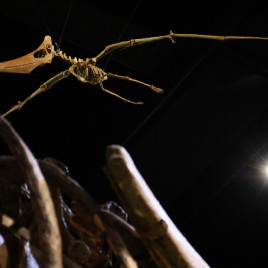
Fossilized teeth found at the Panama Canal resemble those that belong to the family Cebidae, which includes squirrel monkeys such as this one. (Image by Adam via Flickr Creative Commons license)
Fossilized monkey teeth, found during the expansion of the Panama Canal, suggest that monkeys arrived in Central and North America much earlier than previously thought. Researchers believed that monkeys did not reach Central America until a strip of land between North and South America, called the Isthmus of Panama, formed 3.5 million years ago. But this study from Jonathan Bloch and his colleagues at the Florida Museum of Natural History suggests that the primates crossed a water barrier and made it into North America nearly 18 million years earlier. The fossils, which date back 27 million years, also represent the earliest known movement of mammals between North and South America.
Authors:
Jonathan I. Bloch, Emily D. Woodruff, Aaron R. Wood, Aldo F. Rincon, Arianna R. Harrington, Gary S. Morgan, David A. Foster, Camilo Montes, Carlos A. Jaramillo, Nathan A. Jud, Douglas S. Jones & Bruce J. MacFadden.
Corresponding author:
Jonathan I. Bloch
Original paper, published on April 20, 2016 in Nature.
Associated news story published in the same issue of Nature.


